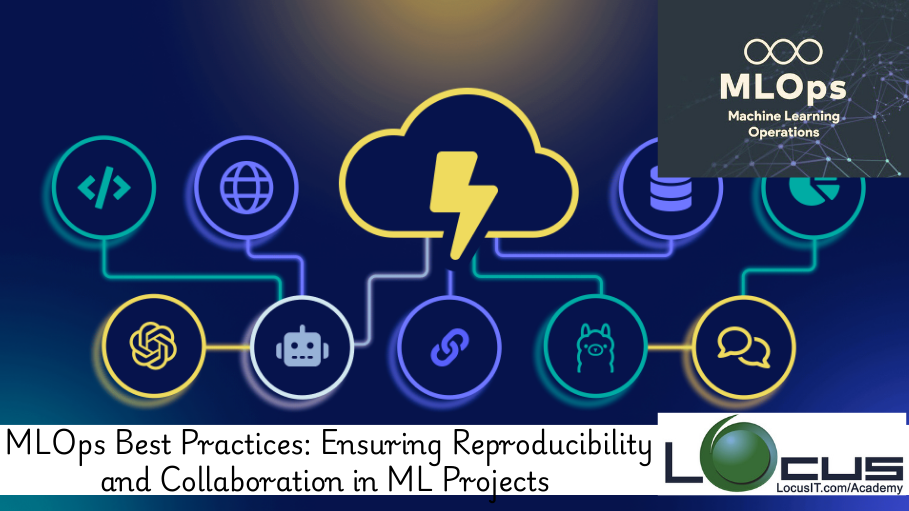Description
Introduction
MLOps, a set of practices that combines machine learning and DevOps principles, is crucial for ensuring that machine learning models are robust, scalable, and easily maintained in production environments. This course focuses on the best practices for ensuring reproducibility, collaboration, and effective management throughout the ML lifecycle. You will learn techniques for versioning, collaboration, and deploying models in a way that promotes transparency, traceability, and efficiency.
Prerequisites
- Basic understanding of machine learning concepts.
- Familiarity with version control tools like Git and data versioning systems.
- Experience with Python and ML libraries such as TensorFlow, PyTorch, or Scikit-learn.
- Knowledge of MLOps principles and tools (CI/CD, Docker, Kubernetes) is helpful but not required.
Table of Contents
- Introduction to MLOps Best Practices
1.1 What is MLOps and Why is it Important?
1.2 Key Challenges in Machine Learning Lifecycle Management
1.3 MLOps Lifecycle and Best Practices Overview - Ensuring Reproducibility in ML Projects
2.1 Versioning Data, Code, and Models
2.2 Managing Dependencies and Environments with Conda and Docker
2.3 Using DVC (Data Version Control) for Dataset Management
2.4 Reproducibility with MLflow and Experiment Tracking - Collaboration in ML Teams
3.1 Best Practices for Collaborative Development in ML Projects
3.2 Managing Jupyter Notebooks and Collaborative Notebooks
3.3 Using Git for Code and Model Versioning
3.4 Collaborative Experiment Tracking with MLflow and TensorBoard - Automating and Streamlining the ML Workflow
4.1 Setting Up CI/CD for ML Pipelines
4.2 Automating Data Preprocessing and Feature Engineering
4.3 Continuous Model Training and Evaluation
4.4 Automating Model Deployment and Monitoring - Model Governance and Compliance
5.1 Tracking Models with Model Registries
5.2 Ensuring Model Auditing and Versioning for Compliance
5.3 Implementing Fairness, Transparency, and Accountability in Models
5.4 Using Policies for Model Validation and Testing - Scaling ML Workflows and Infrastructure
6.1 Scaling Training with Distributed Machine Learning
6.2 Leveraging Cloud Platforms and Managed ML Services
6.3 Kubernetes for Model Deployment and Scalability
6.4 Optimizing Resources for Cost-effective Model Operations - Monitoring and Managing Model Drift
7.1 Techniques for Detecting Model Drift and Concept Drift
7.2 Implementing Retraining Pipelines and Triggering Updates
7.3 Monitoring Model Performance in Production
7.4 Handling Model Retraining and Feedback Loops - Security and Privacy Best Practices in MLOps
8.1 Ensuring Data Privacy in ML Workflows
8.2 Securing ML Models and APIs
8.3 Implementing Role-Based Access Control (RBAC) and Secrets Management
8.4 Auditing and Securing Pipelines for ML Model Integrity - Case Studies and Real-world Applications
9.1 MLOps for Healthcare: Ensuring Reproducibility and Compliance
9.2 Collaborative ML Projects in Financial Services(Ref: Building CI/CD Pipelines for Machine Learning with MLOps)
9.3 Automating Deployment and Monitoring for NLP Models
9.4 Scaling ML Models for Real-time Applications in E-commerce - Hands-on Labs and Capstone Project
10.1 Versioning and Reproducibility with DVC and Git in ML Projects
10.2 Setting Up CI/CD Pipelines for Continuous Model Training and Deployment
10.3 Managing Experimentation and Collaboration with MLflow
10.4 Capstone Project: Build a Reproducible and Scalable MLOps Pipeline for an ML Application
Conclusion
This course equips you with the essential best practices for MLOps, ensuring that machine learning models are reproducible, scalable, and deployable in a collaborative environment. You will gain the skills to manage data, code, models, and experiments effectively, fostering collaboration and efficiency in ML projects while promoting transparency, security, and governance throughout the ML lifecycle.







Reviews
There are no reviews yet.